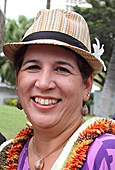 Aloha mai kākou. My name is Maile Alau. My parents are Henry Kailianu Alau and Elizabeth McCormack Alau. While our ‘ohana’s land and roots are on the island of Maui, I was born in Omaha, Nebraska where my father was stationed as a U.S. Air Force officer. For the first 11 years of my life, we moved around the continent, living in places as diverse as Alaska and Virginia. In 1982, we returned to Hawai‘i and my immediate ‘ohana settled in Kahalu‘u, O‘ahu. After graduating from the Kamehameha Schools in 1989, I attended St. Mary’s College of California and majored in English. I returned to Hawai‘i in 1995 and began working at the Nature Conservancy of Hawai‘i. It was here that I first began reconnecting to my Hawaiian roots through learning about plants and the stories and cultural uses related to them, the ecology of Hawai‘i, and how truly unique our islands are.
Aloha mai kākou. My name is Maile Alau. My parents are Henry Kailianu Alau and Elizabeth McCormack Alau. While our ‘ohana’s land and roots are on the island of Maui, I was born in Omaha, Nebraska where my father was stationed as a U.S. Air Force officer. For the first 11 years of my life, we moved around the continent, living in places as diverse as Alaska and Virginia. In 1982, we returned to Hawai‘i and my immediate ‘ohana settled in Kahalu‘u, O‘ahu. After graduating from the Kamehameha Schools in 1989, I attended St. Mary’s College of California and majored in English. I returned to Hawai‘i in 1995 and began working at the Nature Conservancy of Hawai‘i. It was here that I first began reconnecting to my Hawaiian roots through learning about plants and the stories and cultural uses related to them, the ecology of Hawai‘i, and how truly unique our islands are.
Over the next 15 years, I worked with many non-profits on O‘ahu, always getting closer and closer to working with the Native Hawaiian community. In 2009, I began working with Hawai‘i Maoli and learned about the Hawaiian Civic Club movement, the work of Prince Jonah Kūhiō Kalaniana‘ole, and the cultural and historical preservation efforts of the clubs. In 2012, I became Executive Director of Hawai‘i Maoli and have been focused on supporting the civic clubs and other Native Hawaiian serving organizations to help create strong, resilient Hawaiian communities. In my role as Executive Director, I feel a strong kuleana to all the civic clubs, to our kupuna, and to the next generation of Hawaiians that is embodied in my two sons.
I am excited to learn and grow through the First Nations’ Futures Program, and look forward to deepening and expanding my cultural connection and knowledge. I feel truly blessed to have the opportunity to connect with the other fellows in my cohort and sharing our ‘ike to move our lāhui forward.
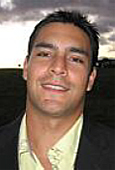 Leo Kaniela Caires was born and raised in the Kuiaha-Kaupakulua homesteads of Hamakualoa Maui. His mother’s native Hawaiian family roots are from Haneoo, Hana and his father’s are from the Azores Islands of Portugal who arrived in Hawaii in the 1800’s in the territory of Hawaii.
Leo Kaniela Caires was born and raised in the Kuiaha-Kaupakulua homesteads of Hamakualoa Maui. His mother’s native Hawaiian family roots are from Haneoo, Hana and his father’s are from the Azores Islands of Portugal who arrived in Hawaii in the 1800’s in the territory of Hawaii.
Growing up on Maui and sharing a lot of time between Hana and Kaupakulua has shaped him into a true paniolo. A hybrid of a Hawaiian and Cowboy culture merged into one spirit. The environment in which he grew up instilled a strong foundation for service, caring for people, animal husbandry, environment and Hawaiian Culture.
Caires has a strong passion for leadership and is currently completing his Doctorate of Education degree in leadership and management at St. Thomas University, a private catholic institution and is working on understanding the impacts of tourism and tax policies on native Hawaiians and Full-Time residents, as well as impacts of central banking and monetary policy. Caires’ education also includes an M.B.A from Chadron State College Business Academy, a Bachelor’s of Science in Animal Science and Pre-Veterinary medicine from the University of Wyoming’s College of Agriculture and Natural resources as well as a Professional Certificate from Stanford University in Energy Innovation and Emerging Technologies.
Caires has played football and other sports for over 15 years. Attended Maui high school, he was an All-star football player, team MVP and captain, a high school bull riding and state steer wrestling champion and National High school finals rodeo 2 time qualifier. He was awarded a full athletic scholarship to the University of Wyoming as a linebacker where he was a two year team captain, an All-Mountain West Conference player, and MWC player of the week and was an All-American strength and conditioning athlete of the year. Caires played in the 2002 College Senior All-Star Hula Bowl game and was Defensive MVP for his team. He completed his football career as a free agent with the British Columbia Lions football club of Canada and in the LNFA for the L’Hospitalet Pioneers football team in Barcelona, Spain.
Caires is an entrepreneur and investor and co-owns an energy development company Gen-X Energy, which is a progressive renewable energy project developer that focuses on micro grid, solar and wind development in Hawaii. He is also an investor in other enterprises in the agriculture and manufacturing sectors.
His community service includes services as the Mayor appointed Vice-Chair of Cost of Government Commission, Maui Young Business Roundtable, a high school football linebacker and leadership coach, Maui Native Hawaiian Chamber of Commerce, a supporter of St. Joseph Church, a sponsor of rodeo, and actively purchases livestock from Maui 4-H Livestock Association which funds support island youth.
He loves spending time with his family. His other passion and hobbies are horseback riding, rodeo, fishing and going to his family’s Loko in Hana, Maui.
Caires is looking forward to this opportunity in the First Nations’ Futures Program.
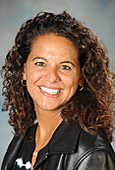 Aloha kākou, my name is Desiré Auguste De Soto. I was born, raised and still reside in Mākaha within the moku of Wai‘anae. Although I will likely always consider Mākaha my home, I cannot deny my innate connection with ‘āina on Maui and Hawai‘i Island where the vast majority of my Native Hawaiian ancestral iwi reside.
Aloha kākou, my name is Desiré Auguste De Soto. I was born, raised and still reside in Mākaha within the moku of Wai‘anae. Although I will likely always consider Mākaha my home, I cannot deny my innate connection with ‘āina on Maui and Hawai‘i Island where the vast majority of my Native Hawaiian ancestral iwi reside.
I am the proud product of a German-born mother, Native Hawaiian/Puerto Rican father, extended family and the public school system of Hawai‘i. In 1996, I earned a Bachelor’s Degree from Whitworth University. After graduating, I returned to Mākaha to share my knowledge with my community and family on the Wai‘anae Coast.
Shortly after my return home I began teaching at Wai‘anae High School. It was after my first two years of teaching high-risk students that the need for positive coping skills became apparent to me. Without this support, students are not able to maximize use of the reading, writing, math, and science we were attempting to teach them. My goal is and always has been to improve the overall well being of the Native Hawaiian community by improving education and economic outcomes. Supporting our ‘ōpio will impact the long-term physical and mental health of the community.
The opportunity to participate in the First Nations’ Futures Program presented itself and I am honored and excited to represent my family and community during this tenth annual cohort experience.
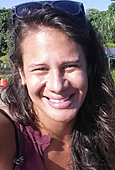 Kiana Frank. I grew up in Kailua, Oahu as the oldest daughter of Stephen and Francine Frank. I am forever indebted to Pauahi as a graduate of Kamehameha Schools Kapālama (2004). I transplanted to the east coast to continue my education at the University of Rochester, NY (B.A, Molecular Genetics) and then jettisoned straight into a Ph.D. program at Harvard (Molecular Biology). Currently, I am junior faculty in SOEST at University of Hawai‘i, Mānoa in the Department of Oceanography. I am immersed in interdisciplinary research that integrates biology, geochemistry, and ʻike kupuna (traditional knowledge) to address novel hypothesis in the field of marine microbial ecology. I study microbes in the ocean. The specific goal of my research program is to better understand how microbes interact with their environment. Microbes – unseen but significant organisms – play critical roles in the environment and shape ecosystems along the ahupuaʻa from ridge to reef. I’ve been of the opinion that “Bacteria Rule!” ever since my freshmen year of high school, when a 7 week molecular cell biology course (the Kamehameha Schools Summer Science Institute) opened my eyes to the wonders of the microscopic world. Majority of my current research effort focuses at Heʻeia Fishpond (Koʻolaupoko, Oahu) and I use microbial analyses to develop a valuable framework to evaluate overall ecosystem health and inform current monitoring, restoration, cultivation, and management efforts within the loko iʻa. At the root of my research is the desire to better understand the connectivity between land and sea to promote the restoration and sustainability of Hawaii’s coastal marine resources. Now that I am back home in Hawaii, I aspire to become an indigenous educator – using scientific hands-on experiences in the ʻāina, our natural laboratories, to inspire the younger Hawaiian generations to cultivate a connection to our culture.
Kiana Frank. I grew up in Kailua, Oahu as the oldest daughter of Stephen and Francine Frank. I am forever indebted to Pauahi as a graduate of Kamehameha Schools Kapālama (2004). I transplanted to the east coast to continue my education at the University of Rochester, NY (B.A, Molecular Genetics) and then jettisoned straight into a Ph.D. program at Harvard (Molecular Biology). Currently, I am junior faculty in SOEST at University of Hawai‘i, Mānoa in the Department of Oceanography. I am immersed in interdisciplinary research that integrates biology, geochemistry, and ʻike kupuna (traditional knowledge) to address novel hypothesis in the field of marine microbial ecology. I study microbes in the ocean. The specific goal of my research program is to better understand how microbes interact with their environment. Microbes – unseen but significant organisms – play critical roles in the environment and shape ecosystems along the ahupuaʻa from ridge to reef. I’ve been of the opinion that “Bacteria Rule!” ever since my freshmen year of high school, when a 7 week molecular cell biology course (the Kamehameha Schools Summer Science Institute) opened my eyes to the wonders of the microscopic world. Majority of my current research effort focuses at Heʻeia Fishpond (Koʻolaupoko, Oahu) and I use microbial analyses to develop a valuable framework to evaluate overall ecosystem health and inform current monitoring, restoration, cultivation, and management efforts within the loko iʻa. At the root of my research is the desire to better understand the connectivity between land and sea to promote the restoration and sustainability of Hawaii’s coastal marine resources. Now that I am back home in Hawaii, I aspire to become an indigenous educator – using scientific hands-on experiences in the ʻāina, our natural laboratories, to inspire the younger Hawaiian generations to cultivate a connection to our culture.
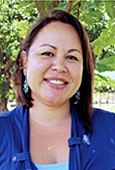 Aloha mai kākou, o wau nō ʻo Jaydene Renee Kaleʻalani Silva. I was born and raised and still reside in the moku of ʻEwa. After graduating from Kamehameha Schools Kapālama, I earned a bachelor’s degree in Hawaiian Studies. I began teaching in the DOE as an 8th grade Hawaiian language and performing arts teacher within my home community of ʻEwa Beach. This led me to further my educational goals and I earned a Master of Education degree from Chaminade University. I currently teach at Leeward Community College in the Teacher Education Program.
Aloha mai kākou, o wau nō ʻo Jaydene Renee Kaleʻalani Silva. I was born and raised and still reside in the moku of ʻEwa. After graduating from Kamehameha Schools Kapālama, I earned a bachelor’s degree in Hawaiian Studies. I began teaching in the DOE as an 8th grade Hawaiian language and performing arts teacher within my home community of ʻEwa Beach. This led me to further my educational goals and I earned a Master of Education degree from Chaminade University. I currently teach at Leeward Community College in the Teacher Education Program.
As a former DOE teacher, I witnessed the need for more Native Hawaiian classroom teachers, and the need for more cultural and ʻāina awareness among the current teacher workforce. My passion for producing homegrown teachers versus hiring out-of-state teachers who make only temporary commitments to our communities, steered me toward research in teacher education and sustainability of our teacher workforce. I earned my PhD in 2014 and my dissertation focused on the supports and barriers for Native Hawaiian prospective teachers. My research continues to focus on indigenous education, teacher education and access for Native Hawaiians to higher education.
In my current teaching role, I incorporate ʻāina-based lesson planning and learning into my courses and require my students to create lessons that focus on mālama ʻāina. I hope to instill in them the importance of place-based learning so that they carry that into their own teaching practice. I feel this benefits all students and teachers, not just the ʻōiwi. Each semester I take my students to Loko ʻea fishpond to give back to the ʻāina, and then to discuss various content areas and ways teachers could incorporate these experiences into a lesson plan through the service they performed (science, language arts, math, etc). I am honored to be part of this hui and look forward to learning from the ʻike that others have to share!
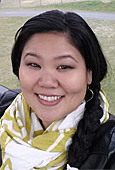 Aloha, my name is Shannon Kalei Toriki and I was born and raised in Pālolo, O‘ahu. I graduated from Kamehameha Schools in 2002 and earned my B.A. in Economics from the University of Hawai‘i at Mānoa in 2009. While an undergraduate, I was very fortunate to have worked with one of my professors, Dr. James Mak, to co-author an economic analysis on the Hawaii cruise tourism industry which was later published in the Research in Transportation Economics Journal.
Aloha, my name is Shannon Kalei Toriki and I was born and raised in Pālolo, O‘ahu. I graduated from Kamehameha Schools in 2002 and earned my B.A. in Economics from the University of Hawai‘i at Mānoa in 2009. While an undergraduate, I was very fortunate to have worked with one of my professors, Dr. James Mak, to co-author an economic analysis on the Hawaii cruise tourism industry which was later published in the Research in Transportation Economics Journal.
After working at the Council for Native Hawaiian Advancement as a policy fellow, I made the move to the Office of Hawaiian Affairs where I started as a grants specialist. My current work at OHA is focused on leveraging my agency’s programs and impacts in ways that are innovative, collaborative and strategic. To that end, my topics of learning and interest are clustered around areas such as big data, evaluation, theories of change, collective impact, philanthropic best practices, system leadership and social enterprise development.


